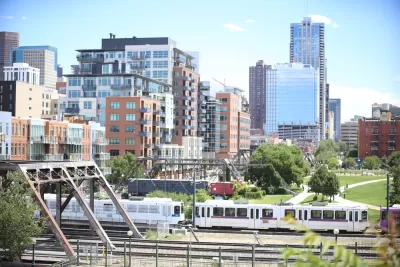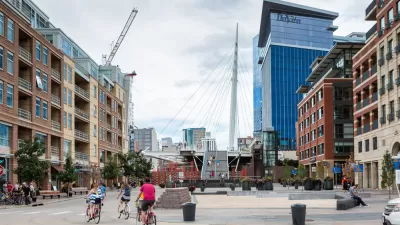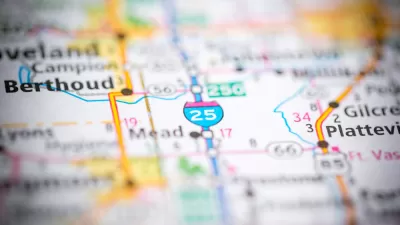Multiple funding plans are on the brink of reformulating the state of Colorado’s approach to transportation—away from cars and toward active transportation and high-capacity public transit.

“Rewrites of Colorado’s statewide 10-year priority project plan and two Front Range regional transportation plans are nearing adoption in the next month,” reports Jon Murray for the Denver Post.
“Especially in metro Denver, they shift big money from expanding pavement to other projects that make it easier, and safer, to travel on public transportation, on bike or on foot.”
The Denver Regional Council of Governments’ 2050 regional transportation plan, one of the plans up for approval this month, would speed up plans for bus rapid transit along busy arterial streets (see previous Planetizen coverage of the DRCOG’s 2020 regional transportation plan). “In the proposed update, those plans have been accelerated — with five projects now set out by 2030 along East Colfax Avenue in Denver, long in planning; a Colfax extension through Aurora; and long stretches of Federal Boulevard, Colorado Boulevard, and Colorado 119 between Boulder and Longmont. More rapid bus corridors would follow in the 2030s,” reports Murray.
Other plans include an updated 2045 regional plan by the North Front Range Metropolitan Planning Organization, which covers a region including Fort Collins and Greeley, and an update to the state’s ten-year project plan, under consideration his week by the Colorado Transportation commission.
Murray gives credit for the shift in transportation funding priority to legislation, SB21-200, approved by the Colorado State Legislature and signed by Governor Jared Polis last year. The Colorado Transportation Commission has already adopted new greenhouse gas emissions rules enabled by that legislation.
FULL STORY: More rapid bus lines, fewer highway expansions: New plans for metro Denver set shift in project funding

Alabama: Trump Terminates Settlements for Black Communities Harmed By Raw Sewage
Trump deemed the landmark civil rights agreement “illegal DEI and environmental justice policy.”

Study: Maui’s Plan to Convert Vacation Rentals to Long-Term Housing Could Cause Nearly $1 Billion Economic Loss
The plan would reduce visitor accommodation by 25% resulting in 1,900 jobs lost.

Planetizen Federal Action Tracker
A weekly monitor of how Trump’s orders and actions are impacting planners and planning in America.

Wind Energy on the Rise Despite Federal Policy Reversal
The Trump administration is revoking federal support for renewable energy, but demand for new projects continues unabated.

Passengers Flock to Caltrain After Electrification
The new electric trains are running faster and more reliably, leading to strong ridership growth on the Bay Area rail system.

Texas Churches Rally Behind ‘Yes in God’s Back Yard’ Legislation
Religious leaders want the state to reduce zoning regulations to streamline leasing church-owned land to housing developers.
Urban Design for Planners 1: Software Tools
This six-course series explores essential urban design concepts using open source software and equips planners with the tools they need to participate fully in the urban design process.
Planning for Universal Design
Learn the tools for implementing Universal Design in planning regulations.
Caltrans
Smith Gee Studio
Institute for Housing and Urban Development Studies (IHS)
City of Grandview
Harvard GSD Executive Education
Toledo-Lucas County Plan Commissions
Salt Lake City
NYU Wagner Graduate School of Public Service





























